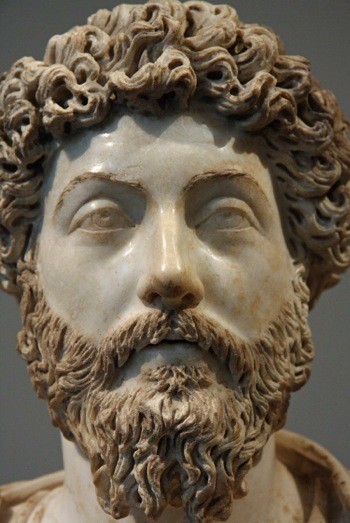 Before we go any further, you really ought to click here and read the thing so you have a grasp on what we are talking about.
Before we go any further, you really ought to click here and read the thing so you have a grasp on what we are talking about.
Go ahead, I’ll wait.
…
You back? Good! That wasn’t so bad. So, where to start?
But what do we mean by “nature?” We see that Seneca makes reference to altars built upon the sources of great rivers. He recounts how men have worshipped hot geysers and describes with great admiration the power of nature in creating mountain caverns. Seneca tells us that if we were to truly examine nature in all its glory, we would be stirred by religious awe.
And so we see that Seneca is likening the idea of nature to an imposing sort of spirituality. This is perhaps unsurprising because as far as the Stoics were concerned, nature was not only related to God, it was synonymous.

We also must understand that the Stoic tenant “live according to nature” not only refers to the divine nature within the universe, but it suggests that we ought to live according to our true human nature, which Seneca believed to be a potentiality for absolute reason.
A Stoic soul would be one that views the hardships and superficial trivialities of modern society with an aloof detachment. Gazing upon the world and all its desires and fear with absolute indifference. And in this way we see that the Stoic’s soul can be elevated above those who would reject wisdom.
“If you see a man undaunted in danger, untouched by passion, happy in adversity, calm in the raging storm, viewing mankind from a higher level and the gods from their own, will you not be moved by veneration?” -Seneca (God Within Man)
Additionally, Seneca tells us that too often we concern ourselves with what we own rather than what we are. It is foolish, stupid even, to praise a man for what he owns. His house, his money, his possessions are merely things around him. They are not within him, they are around him. And so they are not him in any meaningful way. It matters not whether you are a king or a peasant, for it is your inner self, not your possessions, that represents who you really are.
And so, this radiantly perfect being would remain unfettered by danger, unconcerned with passion, and supremely content when faced with adversity. It is from this idea of resigned detachment that we get our modern understanding of the word “stoic.”
Seneca tells us that if we were ever to encounter such an imposing soul, we would be moved to awe and wonder just as we are when we gaze upon a vast ocean or pristine forrest. How can it be that such a grand and lofty spirt be contained within something as fragile as a human body?
Just as the radiance of the sun warms the earth, but originates from a heavenly source, so to does a Stoic soul exist among us, but is prompted by a divine force.
“A soul which is of superior stature and well governed, which deflates the imposing by passing it by and laughs at all our fears and prayers, is impelled by a celestial force. So great a thing cannot stand without a buttress of divinity.” -Seneca (God Within Man)
To further his case, Seneca compares lions submitted to  the arena. The first lion is one that has been trained and worn down so as to submit to grooming and pampering.
the arena. The first lion is one that has been trained and worn down so as to submit to grooming and pampering.
It enters the arena tame and unimpressive. Then there is another lion who enters the arena whose spirit is unbroken, his mane untrimmed, and his ferocity unfettered.
How very impressive would the second lion be when compared to the quiet and worn down animal? His ferocity would be both terrifying and awe inspiring. As Seneca puts it, “The terror he inspires is the essence of his attraction.”
Seneca means to tell us that it is a far more impressive thing to remain true to your nature, rather than to be beaten down and made tame by superficial desires or trivial fears.
However, it is important that we remember that the nature of a lion and the nature of a human being are very different. A lion is no more a lion than when he is wild and fierce, but a man must remain true to his nature, which is a potentiality for reason.
And so to conclude Seneca’s argument, the perfection of nature is synonymous with God. The potentiality for reason within mankind is also a part of nature and therefore is, at least partially, a part of God. And so we see that God exists within all of mankind.
Seneca concludes his letter by noting that while it would seem obvious that we ought to attain wisdom for the sake of self-betterment, the realities of society often make it difficult.
“General derangement makes this difficult; we shove one another into vice. and how can people be recalled to safety when there is a crowd pushing them and nobody to hold them back?” -Seneca (God Within Man)

This final sentiment was most likely mentioned as a way of reflecting on the difficulties that the Stoics encountered when attempting to implement their philosophy within society.
Unlike other, earlier philosophies like
Cyrenaic Hedonism
or Epicureanism that focused on ethical fulfillment for the individual, Stoicism endeavored to achieve nothing short of a societal revolution.It would become quite clear, starting within the age of Hellenistic Greece and into the early days of the Roman Empire, that such a revolution would never occur. The Stoics would settle for attempting to teach influential figures their philosophy in hopes that philosophical perfection within an emperor would permeate, even slightly, to the citizens of a society.
All this aside, Seneca’s God Within Man remains one of the best illustrations of the cosmology and ethics that was so dearly cherished by the Stoic philosophers. Concise and unambiguous, God Within Man is Seneca at his philosophical best. And it would be in your best interest to really consider what is said.
 Before we go any further, you really ought to click here and read the thing so you have a grasp on what we are talking about.
Before we go any further, you really ought to click here and read the thing so you have a grasp on what we are talking about. 
 the arena. The first lion is one that has been trained and worn down so as to submit to grooming and pampering.
the arena. The first lion is one that has been trained and worn down so as to submit to grooming and pampering.









No comments
Trackbacks
Our apologies, you must be logged in to post a comment.